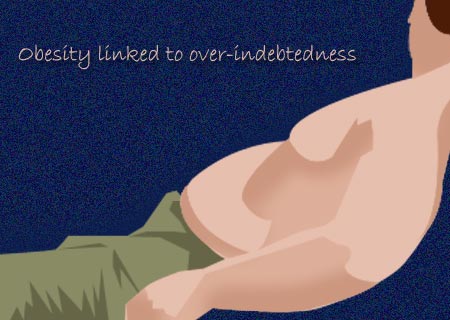The current financial crisis has affected millions across the globe in innumerable ways. The most recent study claims that the health of people too now appears to be going for a toss. Apparently scientists at the University of Mainz seem to have identified a link between over-indebtedness and obesity. The experts found that the tough economic times could worsen the problem as there seems to be a higher risk of over-indebted individuals becoming overweight and obese.
Scientists further elucidate that there appears to be very close correlation between over-indebtedness and obesity. Supposedly over-indebted Germans were found to be more likely of gaining additional pounds or being obese as compared to the population in general. The authors are of the opinion that the high cost of a healthy diet and the lack of awareness regarding the availability of cheaper yet wholesome foods seems to be the primary cause of this problem. However the psychological and social stress faced by over-indebted individuals seems to particularly contribute to their obesity.
Experts reveal that a consequent of this stress is that individuals tend to ‘comfort eat’ and also appear to go easy on their physically activities. Being a one-off survey, the design of the study restricts the scientists from demonstrating a link between cause and effect. Accordingly, the investigators speculate that it could also be possible that obese individuals more frequently lose their jobs and fall into the debit trap. Unemployment, experts claim is the most common cause of over-indebtedness and it brings with it the inability of meeting payments.
As part of the study, Professor Eva Munster along with her team at the Institute of Occupational, Social, and Environmental Medicine assessed data for a total of over 9000 persons. 25% of the 949 over-indebted persons who reportedly completed the questionnaire were noted to be obese. On comparing, experts found that only 11% of the 8318 subjects that symbolized a cross-section of the general population in Germany were obese. The latter were interrogated in a telephone survey that was conducted by the Robert Koch Institute in 2003.
“The current credit crunch will also impact on the health status of private households and could even exacerbate the problem”, shares Professor Munster.
Munster who is also known to be a public health consultant additionally reveals that obesity due to indebtedness should essentially be seen as a social problem. Also condemnation of the affected persons should not be permitted as a result of this. Commonly income, education and occupational status seem to define the socio-economic status of an individual. Having already been largely analyzed, this experts explain could influence the aspect and could be associated to the health status of individuals.
“Our survey has shown that there is an increased probability that a private individual who is over-indebted will be overweight, that is, clinically obese, irrespective of whether the other cited socio-economic factors apply,” mentions Munster. “Energy-dense foods such as sweets and fatty snacks are often less expensive compared to food with lower energy density such as fruit or vegetables.”
If the team associated to this study is to be believed then indebtedness further influences certain factors that predispose to chronic illness. For example individuals who may be indebted limit their leisure activities and participation in social events. Having a negative impact on the quality of a person’s diet, debt appears to affect virtually all members of a household. It includes children as well.
“Over-indebted persons and their families need targeted, group-specific counseling and help with regard to promotion of health and prevention. This is the responsibility of the public health care system, that is, the federal and state ministries and the communes, not forgetting the health insurers,” adds Munster.
Beholding the results of the survey, Munster suggests a low price campaign that should promote the sales of healthy foods. Also she reveals that additional studies, specifically long term ones, would be essential to confirm the figured correlation between cause and effect.
A situation in which the level of debt is no longer manageable, over-indebtedness seems to be present in approximately three to four million households in Germany alone. As shown, the situation of private persons seems to more than just a financial and legal problem. It also seems to have an impact on the social and health aspects.
The novel study is published in the journal BMC Public Health.

